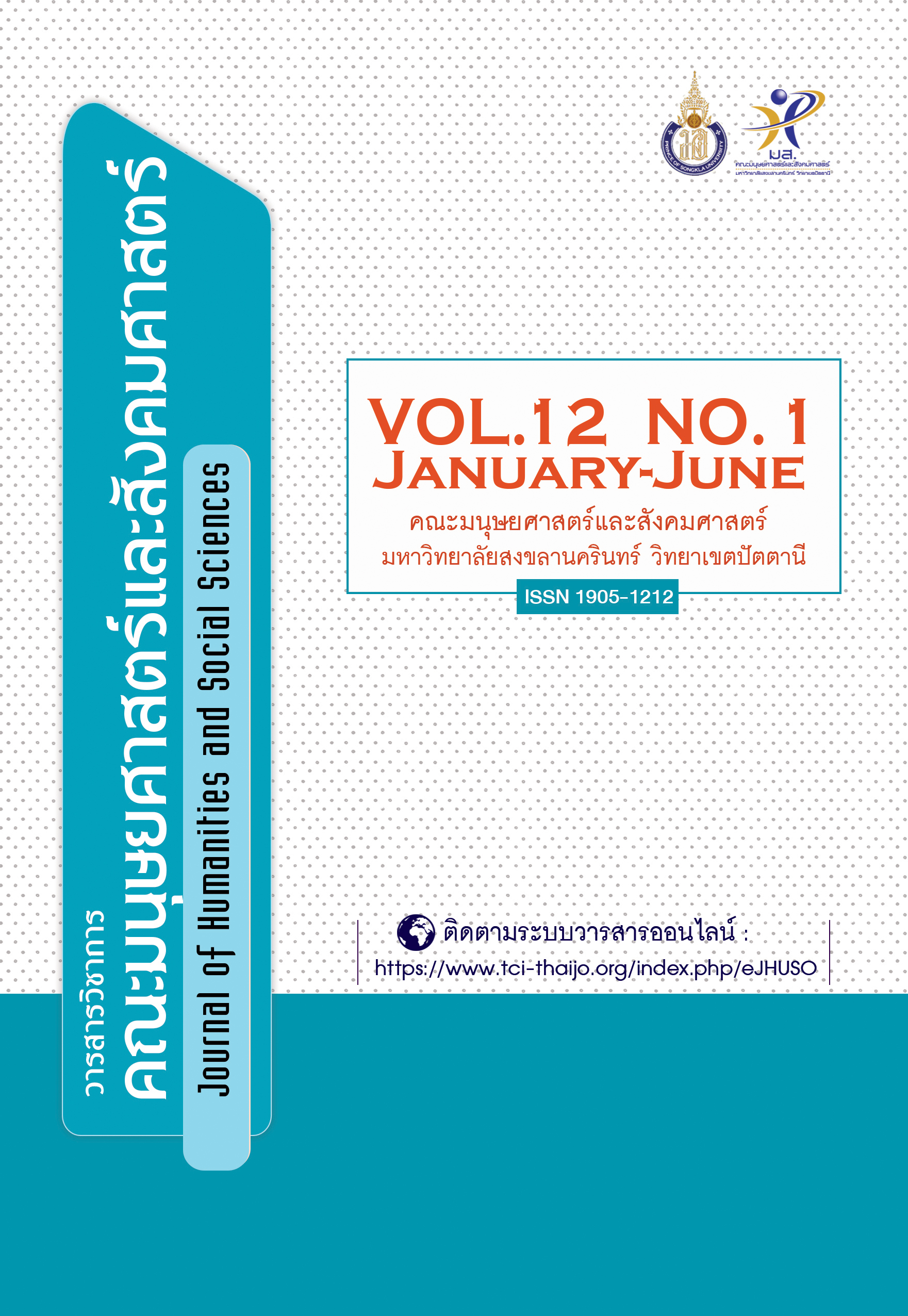นิเวศวิทยาวัฒนธรรม : กุญแจสู่การพัฒนาที่ยั่งยืน
Keywords:
นิเวศวัฒนธรรม, ความยั่งยืน, การพัฒนาอย่างยั่งยืน, Cultural Ecology, Sustainability, Sustainable DevelopmentAbstract
บทความนี้มีจุดมุ่งหมายเพื่อนำเสนอมุมมองของการพัฒนา ที่ยั่งยืน ระดับของการพัฒนาที่ยั่งยืน ปัจจัยพื้นฐานของความ ยั่งยืน แนวคิดการนำวัฒนธรรมเข้ามาเป็นองค์ประกอบหนึ่งของ การพัฒนาที่ยั่งยืน รวมถึงการนำเสนอแนวทางในการพัฒนาที่ ยั่งยืนโดยใช้แนวคิดนิเวศวัฒนธรรมเป็นพื้นฐานของการพัฒนาการศึกษาครั้งนี้ได้ใช้วิธีการวิจัยจากเอกสารที่เกี่ยวข้อง โดยรวบรวม วิเคราะห์ และสังเคราะห์ข้อมูลในส่วนที่เกี่ยวข้อง กับปัจจัยของการพัฒนาที่ยั่งยืน รูปแบบของความยั่งยืนใน ระดับของการพัฒนาที่ยั่งยืน ช่องว่างของการพัฒนาที่ยั่งยืน โดยผลการศึกษาพบว่าพื้นฐานของแนวคิดการพัฒนาที่ยั่งยืนจะ ขึ้นอยู่กับความสัมพันธ์ระหว่าง 3 ปัจจัย คือ สังคม เศรษฐกิจ และสิ่งแวดล้อม โดยการพิจารณาถึงความยั่งยืนมักมีที่มาจาก ปัญหาสิ่งแวดล้อมซึ่งเป็นผลจากการพัฒนาเศรษฐกิจตามแนวคิด ทุนนิยม ดังนั้นการพัฒนาที่ยั่งยืนจึงมีมุมมองในการแก้ปัญหาที่ เกิดขึ้น เชื่อว่าเมื่อแก้ปัญหาได้ก็สามารถนำไปสู่ความยั่งยืนได้ แต่ มนุษย์ที่เป็นสาเหตุหลักที่ทำให้เกิดปัญหากลับไม่มีการดำเนินการ อย่างจริงจัง เช่น การเปลี่ยนวิธีคิด การปรับเปลี่ยนการปฏิบัติ ก็ยากที่จะให้กลไกของการพัฒนาอย่างยั่งยืนเกิดขึ้น ดังนั้นควรที่ จะย้อนมองกลับมาที่วัฒนธรรมซึ่งเป็นปัจจัยที่สำคัญที่ผูกติด อยู่กับมนุษย์นอกเหนือไปจากการพิจารณาด้านเศรษฐกิจ และ สิ่งแวดล้อม อย่างไรก็ตามการพัฒนาอย่างยั่งยืนที่เป็นอยู่ขณะนี้ มีส่วนที่เกี่ยวข้องกับปัจจัยด้านวัฒนธรรมน้อยมาก ดังนั้นจึงควร ผสานวัฒนธรรมที่เป็นกรอบที่ดีสำหรับการดำรงชีวิตเข้าไปสู่ การพัฒนาอย่างยั่งยืน และสามารถนำไปสู่สังคมที่ยั่งยืนที่อยู่ บนพื้นฐานของทนุทางวัฒนธรรมที่มีอยู่ในแต่ละท้องถิ่นเป็นหลักถึงแม้ว่าได้นำวัฒนธรรมเข้ามาเป็นส่วนประกอบของความยั่งยืน แล้วกลับพบว่ายังไม่คลอบคลุมเนื่องจากวัฒนธรรมยึดโยงอยู่กับ คน และในขณะที่คนผูกติดอยู่กับพื้นที่ ดังนั้นจึงจำเป็นที่จะต้อง พิจารณาถึงสภาพแวดล้อมที่กำหนดความเป็นพื้นที่ นั่นคือ แนวทางหนึ่งที่มิติของการพัฒนาอย่างยั่งยืนควรดำเนินไป ได้แก่ แนวทางการพัฒนาที่อยู่บนพื้นฐานของนิเวศวิทยาวัฒนธรรม ซึ่งได้ให้ความสำคัญกับระบบวัฒนธรรมควบคู่ไปกับระบบนิเวศ ของพื้นที่ โดยมุ่งเน้นที่ระบบนิเวศ และภูมิปัญญาท้องถิ่นที่มนุษย์ ใช้ในการปรับตัวเข้ากับสภาพแวดล้อมที่เป็นเอกลักษณ์และ แตกต่างกันในแต่ละพื้นที่ นั่นคือการอยู่ร่วมกับสภาพแวดล้อม ดังนั้นการพัฒนาที่ยั่งยืนควรอยู่บนพื้นฐานของระบบนิเวศ วัฒนธรรมแต่ละท้องถิ่นเพื่อนำไปสู่การพัฒนาที่ยังยืนได้
Cultural Ecology: A Key to Sustainable Development
This article aims to present the perspective of sustainable development, the level of sustainable development, the fundamental factors of sustainability concept, and the use of culture as a component of sustainable development. Also, this study aims to propose guidelines for sustainable development based on the concept of cultural ecology.
The documents research methodology was used in this study by collecting, analyzing, and synthesizing information in relation to the factors of sustainable development, models of sustainability, the level of sustainable development, and the gap of sustainable development.
The study found that the definition of sustainable development is fundamentally based on a sustainable relationship between three factors: social factor, economic factor, and environmental factor. Usually, sustainable development is considered after the emergence of environmental problems from economic development based on the concept of capitalism. Therefore, it is believed that if these kinds of problems are solved, the sustainability will be created. However, humans who are the key factor of the problems haven’t changed their mindset and taken action seriously. Therefore, culture which is another essential factor relating to human should also be taken into consideration. Indeed, it is also necessary to consider the environment which can be used to define the space due to the fact that humans attach to area. Consequently, the cultural ecology was proposed as guidelines for sustainable development since it focuses on cultural system as well as local ecological system, especially ecological system and local wisdom which humans use to adjust themselves to different unique areas.
Downloads
How to Cite
Issue
Section
License
บทความนี้ได้รับการตีพิมพ์เป็นของวารสารวิชาการคณะมนุษยศาสตร์และสังคมศาสตร์ คณะมนุษยศาสตร์และสังคมศาสตร์ มหาวิทยาลัยสงขลานครินทร์ วิทยาเขตปัตตานี



